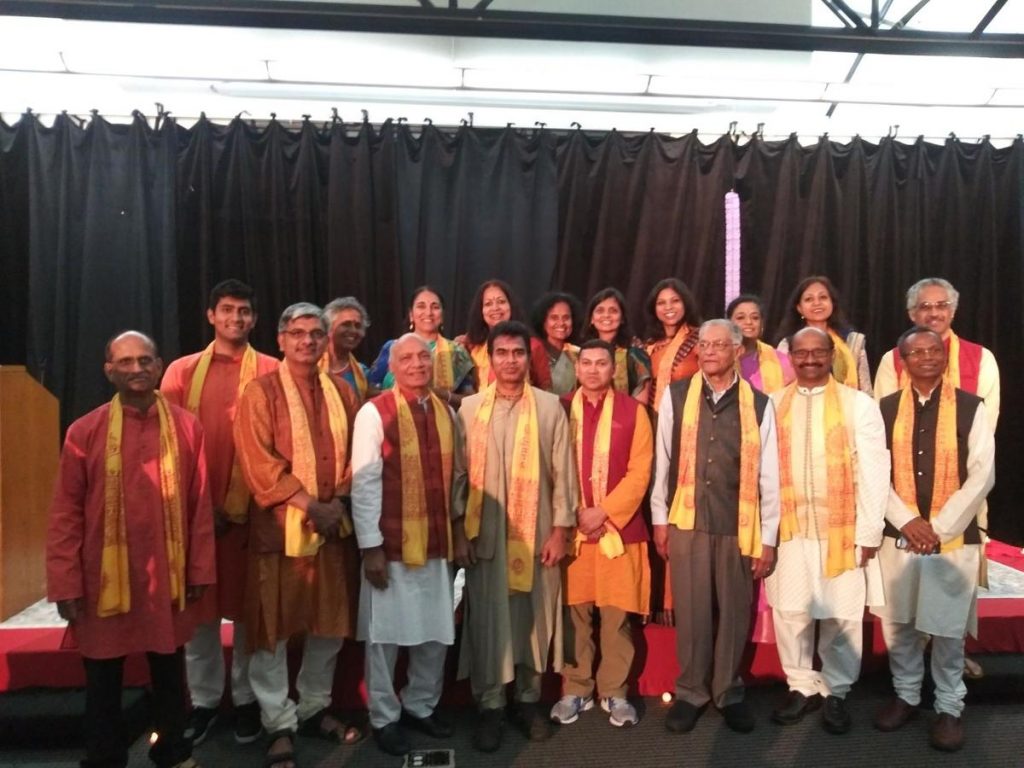
MILPITAS, Calif. — The Hindu Community Institute introduced its inaugural group of Counselors of Hindu Tradition at a graduation ceremony here Aug. 18 morning.
The 20 members of the class each spent four hours over 34 Sundays, learning how to apply Vedic philosophy and counseling to help navigate the Indian American community and others through the challenges of contemporary life. The faculty for the program was comprised of leaders of Jewish and Buddhist faiths, estate planners, and professional counselors trained in aging and wellness, and palliative — end of life — care.
“Hundreds of volunteers worked very hard to create a unique institute to celebrate our rich cultural heritage,” emcee Latha Vasan told the audience, adding that the new CHTs have been trained in how best to serve their community.
The CHTs will now man a “Sanskara guidance center” help-line which people can call to get guidance with various issues. They will work from a newly-created field operations manual.
The CHTs will also do outreach at schools, temples, hospitals, and nursing homes, working with families.
“In India everywhere, you breathe culture and tradition. Here you have that in isolated pockets. There are no social mechanisms for dealing with difficult circumstances in everyday life,” Kailash Joshi, HCI’s president of strategy and oversight, told India-West ahead of the graduation ceremony. “The wisdom and knowledge of the Bhagavad Gita deals with difficult circumstances, including family conflicts and dealing with elderly people,” he said, adding: “We want to help people manage the various stages of their lives.”
Gaurav Rastogi, dean of administration and outreach, said: “We have a very rich culture, but many of our children know nothing about it. We live apart from everyone else.”
“We are lonely, leading a low quality of life, despite our prosperity and high achievements,” he said, noting that loneliness has become an epidemic.
“Dharma sustains society. Clearly, society needs more dharma to maintain the social order,” said Rastogi, explaining that Indian American society needs extended family support and avenues to share happiness and sorrows.
In Judaism, when a baby is born, a rabbi shows up and teaches the family traditions, said Rastogi, adding: “We want to have that in the Hindu tradition.”
Several rabbis, who served as faculty members for the inaugural class of graduates, were honored with shawls during the ceremony.
One year ago, the HCI reached out to several partner organizations to find its first batch of CHTs. The minimum requirement was a college degree; being a Hindu was not a requirement. Rastogi joked that two-thirds of the graduating class were lapsed engineers. “Clearly, we engineers see we have to go beyond,” he said, eliciting a laugh from the audience. “There is a huge latent desire in us to serve our community.”
Mukund Acharya, head of HCI’s operational services, who characterized himself as a lapsed engineer, noted that Hindu tradition has a separation of temple and seva, or service. “Our community did not need a service structure because we breathed service all day long.”
Modern times, however, require a more formalized system, he explained. HCI is based on the concept of a seed. “One seed contains infinite apples,” said Acharya.
Each graduate received a certificate of commendation from Rep. Ro Khanna, D-Calif., and California state Assemblymember Ash Kalra, along with a framed diploma. Graduate Mangala Kumar, who spearheaded the effort to create the field operations manual, was announced as HCI’s newest board member.
Singers from Yoga Bharti and musicians from the Gayathri Pariwar kicked off the celebrations by performing mantras.
HCI is now recruiting students for its 2020 class, which begins in October. It has also begun an intensive fund-raising effort. Prospective scholars can learn more about participating at hinduci.org.
Rastogi and Joshi both stated to India-West that the HCI is not affiliated with any political party in the U.S. or India and strives to be apolitical.





